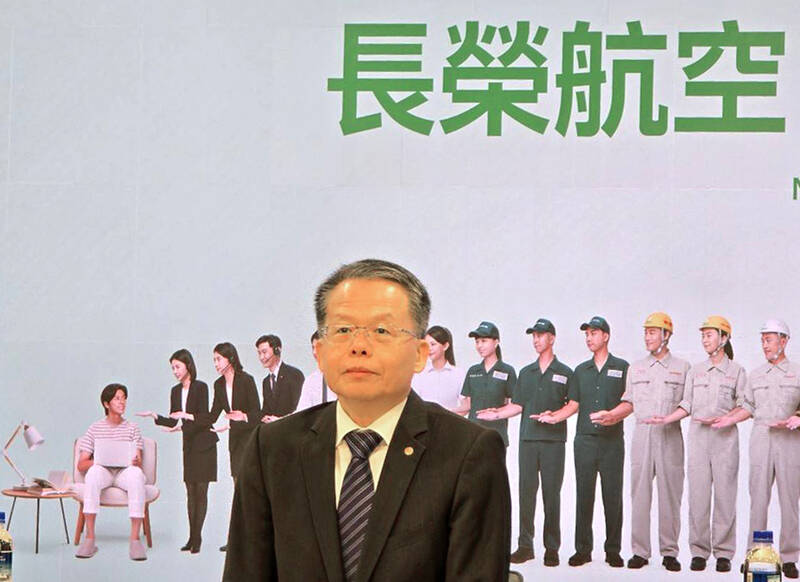Amid booming travel demand across the globe, airfares will not go back to levels seen before the COVID-19 pandemic and high airfares will continue into next year, EVA Airways Corp (長榮航空) said yesterday.
The trend toward higher fares has been driven by robust air passenger travel around the globe combined with inflationary pressures and service capacity restraints, EVA Air president Clay Sun (孫嘉明) said at an investors’ conference in Taipei.
Sun’s remarks came as American Express Global Business Travel Group Inc said in its annual report recently that global airfares are set to become more expensive next year even as gains moderate, with ticket prices reflecting higher costs and lingering supply-chain disruptions.

Photo: CNA
Fares on most routes will rise, though the size of the increases will likely vary greatly by region. North America and Europe are expected to see more “modest” increases of around 2 percent while Asia and Australasia, among the last regions to unwind pandemic curbs, are set to see rises of close to 14 percent, the report said.
EVA Air is expected to see 20.4 percent growth in the Northeast Asian passenger market this year, well above its average growth for the rest of the world, Sun told investors, adding that the Asia-Pacific market is to see even stronger growth next year.
In the first 10 months of this year, the airline saw overall passenger revenue grow 8.4 percent year-on-year, while passenger numbers jumped nearly 20 percent and capacity (measured by available seat kilometers) rose 9.7 percent.
By region, the US market accounted for 44 percent of total passenger revenue, followed by Northeast Asia at 19 percent and Europe at 15 percent, EVA Air said.
Given the expected growth in passenger demand next year, the airline is working on new passenger and cargo charter flights to Japan’s Hakodate during the Lunar New Year holiday in January next year and on the addition of flights to Aomori and Matsuyama for the cherry blossom season.
EVA Air also intends to add flights to Kobe during the April-to-October period to provide more capacity for travelers headed to next year’s Osaka World Expo, Sun said.
The airline has also decided to add Dallas to its other eight destinations in North America, and it expects to fly five weekly flights to the Texas city starting on Nov. 3 next year, he said.
At a time when many high-tech companies are moving their headquarters from Silicon Valley to Texas, Dallas is a good fit for EVA Air to complete its network for transit passengers proceeding to Central and South America, he added.
EVA Air is also upbeat about the prospects of its air cargo business, Sun said, citing the growth of artificial intelligence applications and strong demand from the e-commerce sector.
The airline reported revenue of NT$57.16 billion in the third quarter, up 7.3 percent year-on-year, while net profit soared 50.8 percent to NT$8.99 billion, with earnings per share (EPS) of NT$1.66.
In the first three quarters of this year, the airline posted combined revenue of NT$164.45 billion, an annual increase of 12.4 percent, while net profit totaled NT$21.49 billion, up 31 percent, with EPS of NT$3.98, the highest ever for the nine-month period, it said.

Application-specific integrated circuit designer Faraday Technology Corp (智原) yesterday said that although revenue this quarter would decline 30 percent from last quarter, it retained its full-year forecast of revenue growth of 100 percent. The company attributed the quarterly drop to a slowdown in customers’ production of chips using Faraday’s advanced packaging technology. The company is still confident about its revenue growth this year, given its strong “design-win” — or the projects it won to help customers design their chips, Faraday president Steve Wang (王國雍) told an online earnings conference. “The design-win this year is better than we expected. We believe we will win

Intel Corp chief executive officer Lip-Bu Tan (陳立武) is expected to meet with Taiwanese suppliers next month in conjunction with the opening of the Computex Taipei trade show, supply chain sources said on Monday. The visit, the first for Tan to Taiwan since assuming his new post last month, would be aimed at enhancing Intel’s ties with suppliers in Taiwan as he attempts to help turn around the struggling US chipmaker, the sources said. Tan is to hold a banquet to celebrate Intel’s 40-year presence in Taiwan before Computex opens on May 20 and invite dozens of Taiwanese suppliers to exchange views

Chizuko Kimura has become the first female sushi chef in the world to win a Michelin star, fulfilling a promise she made to her dying husband to continue his legacy. The 54-year-old Japanese chef regained the Michelin star her late husband, Shunei Kimura, won three years ago for their Sushi Shunei restaurant in Paris. For Shunei Kimura, the star was a dream come true. However, the joy was short-lived. He died from cancer just three months later in June 2022. He was 65. The following year, the restaurant in the heart of Montmartre lost its star rating. Chizuko Kimura insisted that the new star is still down

While China’s leaders use their economic and political might to fight US President Donald Trump’s trade war “to the end,” its army of social media soldiers are embarking on a more humorous campaign online. Trump’s tariff blitz has seen Washington and Beijing impose eye-watering duties on imports from the other, fanning a standoff between the economic superpowers that has sparked global recession fears and sent markets into a tailspin. Trump says his policy is a response to years of being “ripped off” by other countries and aims to bring manufacturing to the US, forcing companies to employ US workers. However, China’s online warriors